2023 - A Year in Books
Jan 8, 2024
Contents
- Introduction
- Non-Fiction
- An Immense World: How Animal Senses Reveal the Hidden Realms Around Us - Ed Yong
- Chip War: The Fight for the World's Most Critical Technology - Chris Miller
- Ultra-Processed People: The Science Behind Food That Isn't Food - Chris van Tulleken
- How to Think Like a Roman Emperor: The Stoic Philosophy of Marcus Aurelius - Donald J. Robertson
- Stolen Focus: Why You Can't Pay Attention and How to Think Deeply Again - Johann Hari
- The Chaos Machine: The Inside Story of How Social Media Rewired Our Minds and Our World - Max Fisher
- A Swim in a Pond in the Rain: In Which Four Russians Give a Master Class on Writing, Reading, and Life - George Saunders
- The Pragmatic Programmer: From Journeyman to Master (20th Anniversary Edition) - Andy Hunt and Dave Thomas
- Fiction
- A Final Word
- Stats
Introduction
Welcome to the 4th edition of my annual reading round-up.
For me, 2023 was a year of three parts. January to March continued as 2022 had ended, juggling high-pressure jobs and struggling to read after long and gruelling workdays. From April to July, Lydia and I left that all behind and embarked on our 4-month backpacking adventure. After returning in late July, we moved to a new city and settled into new (and less stressful, at least for me) jobs. Despite the instability of the year, I was able to read fairly consistently and finished on 61 books (27,253 pages) for 2023 (a hefty average of 446 pages per book!). Beating my one book per week target for the 8th year running. In June, I also reached 500 books since starting my reading challenge in 2016 and wrote about why, how and what it's taught me in another blog post. Finally, not quite relevant to this post but still something I'm proud of, I hit a 1000-day streak on Headspace (1228 days at the time of writing).
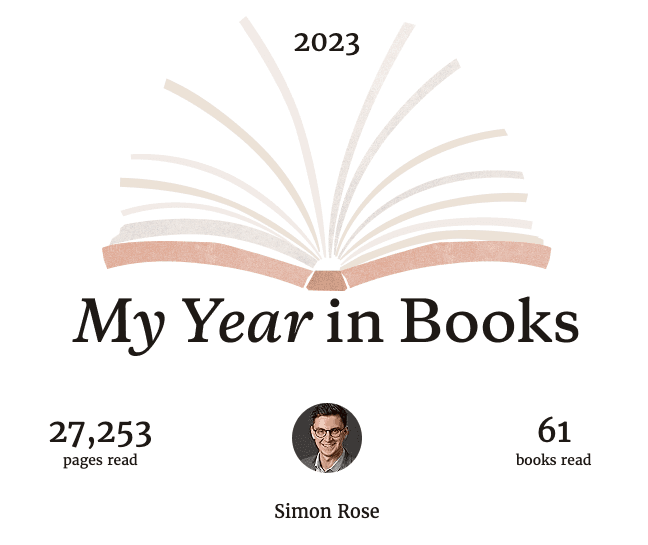
This post covers my top books from 2023. However, in a slight change from previous years, I've decided to include 8 non-fiction and 4 fiction, to better represent my favourites from the year. As usual, I have one fiction and one non-fiction book on the go at once, I track my reading on Goodreads and I tend to find new books on there (through the family and friends who also use it) or by browsing the shelves in Waterstones.
Let's get going...
Non-Fiction
It was particularly difficult to choose my top non-fiction books this year. As is standard practice, I try to read as broadly as I can and this year threw up a set of particularly excellent books. In no particular order...
An Immense World: How Animal Senses Reveal the Hidden Realms Around Us - Ed Yong
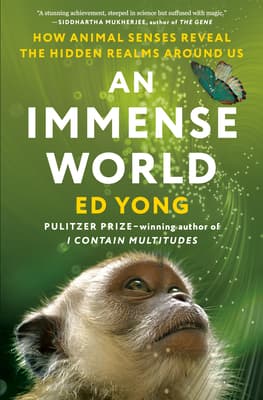
An Immense World encourages the reader to see the world through the senses of other animals. Yong describes all animals as having an 'umwelt': it's perceptual world limited by their senses. As humans, ours is sight-heavy and forward-facing, and it's very easy to project that onto other animal species. However, nature is full of weird and wonderful ways of perceiving the world that are completely outside of our perception. From beetles that are drawn to fires, turtles that can track the Earth's magnetic fields, fish that fill rivers with electrical messages, humans that wield sonar like bats and ultraviolet colours that we cannot see. It's one of those books that I couldn't stop highlighting quotes from (287 in total!). It is fascinating, paradigm-shifting, and whilst technical at times finishes with a poignant discussion of the impact of modern human life on our natural world (much along the lines of the new Planet Earth series). In modern society, we often see ourselves as separate from nature. An Immense World puts us back in our place as one of the millions of species on this incredible planet.
"The senses transform the coursing chaos of the world into perceptions and experiences - things we can react to and act upon."
"Earth teems with sights and textures, sounds and vibrations, smells and tastes, electric and magnetic fields. But every animal can only tap into a small fraction of realities fullness. Each is enclosed within its own unique sensory bubble, perceiving but a tiny silver of an immense world."
"A moth will never know what a zebra finch hears in its song, a zebra finch will never feel the electric buzz of a black ghost knifefish, a knifefish will never see through the eyes of a mantis shrimp, a mantis shrimp will never smell the way a dog can, and a dog will never understand what it is to be a bat. We will never fully do any of these things either, but we are the only animal that can try."
Chip War: The Fight for the World's Most Critical Technology - Chris Miller
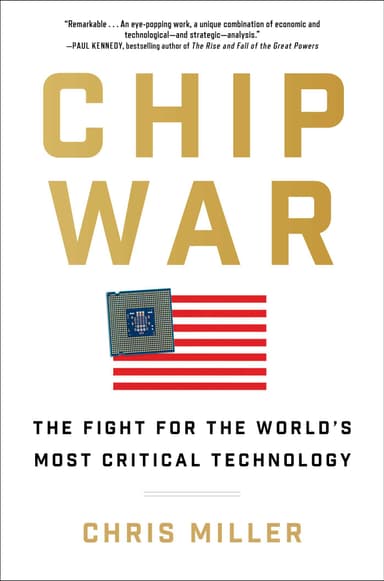
Chip War is a fascinating narrative history of semiconductors and their use in microchips, which have ousted oil to become the most critical resource in modern society and the foundation of modern military, economic and geopolitical power. They have become ubiquitous, and are a key component in our everyday lives. From mobile phones, laptops and cars, to kitchen appliances, medical devices, security systems and even children's toys.
In the book, Miller charts the history of computer chip development from its early stages as a US military project, to the drive to fit more and more transistors on each chip, and their impact on the current geopolitical climate. The book drives home how reliant we are on something so complex and expensive to produce, and that relies on several countries across the globe to keep the supply chain moving. It also explains why China are investing so much into semiconductors, to reduce their reliance on patents from the US, EUV lithography machines from the Netherlands (that have 457,329 component parts and cost over $100,000,000 each) and posturing to control the Taiwanese state-intertwined factories where 37% of all chips are made.
Chip War is a superb book for anyone interested in the technology behind our modern world.
"Every button on your iPhone, every email, photograph, and YouTube video - all of these are coded, ultimately, in vast strings of 1s and 0s. But these numbers don’t actually exist. They’re expressions of electrical currents, which are either on (1) or off (0). A chip is a grid of millions or billions of transistors, tiny electrical switches that flip on and off to process these digits, to remember them, and to convert real world sensations like images, sound, and radio waves into millions and millions of 1s and 0s."
"Apple sold over 100 million iPhone 12s, each powered by an A14 processor chip with 11.8 billion tiny transistors carved into its silicon."
"Today, building an advanced logic fab costs $20 billion, an enormous capital investment that few firms can afford."
"The world still has several hundred million subsistence farmers who’d happily fasten components into an iPhone for a dollar an hour."
Ultra-Processed People: The Science Behind Food That Isn't Food - Chris van Tulleken
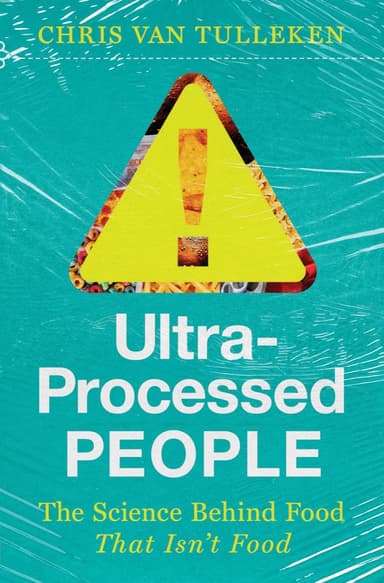
A mind-blowing manifesto about the new age of eating, driven not by nutrition but by corporate greed. In Ultra-Processed People, Van Tulleken explores the world of UPF (Ultra Processed Food), which he defines as food containing any ingredients that you wouldn't find in your kitchen, and that didn't exist a century ago. We all eat UPF every day, in varying amounts, and Van Tulleken argues that our bodies simply don't know what to do with these novel chemicals that are so far outside our evolutionary capability. He explores the history and impact of gums, stabilisers, artificial sweeteners and emulsifiers on our physical and mental health, presenting an argument that is terrifying both on a personal and societal level.
I've had a keen interest in nutrition since I read The China Study and How Not to Die in 2017 (including a 2-year vegan stint shortly after). Ultra-Processed People is refreshing in that it focuses not on individual 'willpower', but on the larger issue of corporate greed driving the creation of 'food' that is cheap to produce, has a long shelf-life and is genetically engineered for us to eat more and more of. He argues that it's not our fault we're obese or that we eat full sharing bags of Doritos in one sitting, it's that we're part of a system that genetically engineers and aggressively markets food that we can't get enough of, and that is so cheap that it's often the only thing those in poverty can afford.
"UPF now makes up as much as 60 per cent of the average diet in the UK and the USA. Many children, including my own, get most of their calories from these substances."
"UPF damages the human body and increases rates of cancer, metabolic disease and mental illness, that it damages human societies by displacing food cultures and driving inequality, poverty and early death, and that it damages the planet."
"Ultra-processing reduces micronutrients to the point that modern diets lead to malnutrition even as they cause obesity."
How to Think Like a Roman Emperor: The Stoic Philosophy of Marcus Aurelius - Donald J. Robertson
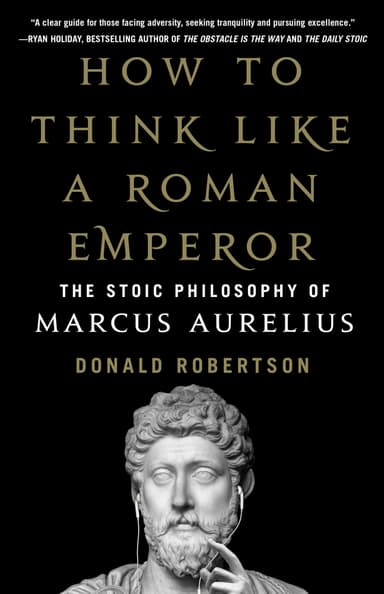
Marcus Aurelius was a true philosopher king. As Roman Emperor, he was arguably the most powerful person on Earth. Yet his personal journal, which he never intended anyone to read, is a remarkable series of reflections of a man struggling with the experience we all share: to understand himself and his place in the universe. In How to Think Like a Roman Emperor, Robertson weaves the narrative of Aurelius' life, with classic Stoic wisdom and modern psychology, into a guide on how to live.
Stoic philosophy has had an immeasurable impact on my life since I stumbled upon it in 2017 initially through Ryan Holiday's books. Stoicism has given me a lens through which to understand the chaos and instability of the world and my role within it. In 2023, I also read The Daily Stoic as my daily meditation book for the third time (for those interested, I've also read 365 Tao and A Calendar of Wisdom, and 2024's book is The Daily Laws.) How to Think Like a Roman Emperor is an excellent starting point for anyone interested in Stoicism, struggling with their place in the universe, or simply wanting to be a better person.
"The Stoics adopted the Socratic division of cardinal virtues into wisdom, justice, courage, and moderation. The other three virtues can be understood as wisdom applied to our actions in different areas of life."
"The Stoic Sage, or wise man, needs nothing but uses everything well; the fool believes himself to “need” countless things, but he uses them all badly."
"The wise man is grateful for the gifts life has given him, but he also reminds himself that they are merely on loan—everything changes and nothing lasts forever."
"Fear of death does us more harm than death itself because it turns us into cowards, whereas death merely returns us to Nature."
Stolen Focus: Why You Can't Pay Attention and How to Think Deeply Again - Johann Hari
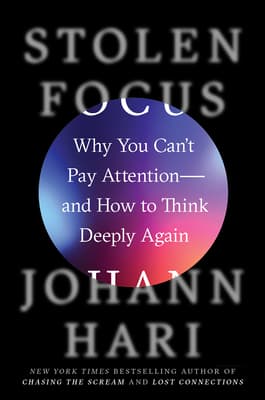
In Stolen Focus, Hari explores the reasons behind the recent decimation of our attention spans. He does this through a narrative of personal discovery, describing his own journey to reclaim his ability to think deeply. The book touches on many societal and individual changes over the last century that have impacted our ability to concentrate: social media, instant entertainment, ultra-processed food, sleep, long working hours, education and trauma. One part of this that particularly resonated with me was 'cruel optimism', the idea that individuals must change their behaviour or habits when all the odds are stacked against them by society and big business (a big theme in my reading this year).
One of my biggest takeaways from the book was the benefit of slowing down, doing less and giving your mind more time to wander. As a society we are obsessed with 'doing', Hari presents evidence that valuable reflection and our best ideas instead happen when we switch off. In hindsight, I tried to 'do' far too much in 2022, which despite material and physical gains, had a terrible impact on both my physical and mental health. Hari's argument is a fine antidote to the achievement and growth-obsessed worldview pervasive in our society.
"The truth is that you are living in a system that is pouring acid on your attention every day, and then you are being told to blame yourself and to fiddle with your own habits while the world’s attention burns."
"Think of history, and prehuman history. We have to chase things to eat. We have to hide from things that want to eat us, and (we have to) seek. We need to build shelter. Everybody does that for a million years, and just this generation, we’ve taken it all away."
"The evidence is clear, Earl told me: there’s no alternative, if you want to do things well, to focusing carefully on one thing at a time."
The Chaos Machine: The Inside Story of How Social Media Rewired Our Minds and Our World - Max Fisher
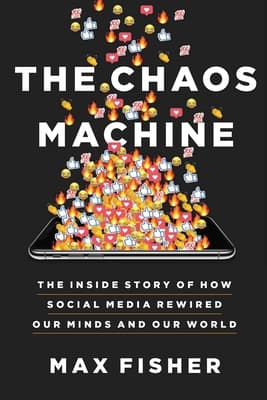
The Chaos Machine tells the terrifying story of how social media companies have hacked our minds and our society in pursuit of unfettered profit (much in the same vein as The Age of Surveillance Capitalism, which made my top 10 in 2020). In the book, Fisher explains the techno-libertarian free-speech philosophy behind Facebook, YouTube, et al., and how their algorithms prey on our psychological weaknesses, such as our need to feel valued and included, to drive us to extreme opinions and extreme actions through misinformation, outrage and fear.
It's an eye-opening book that pulls back the curtain on Big Tech and what it will do to protect profits and keep you scrolling. Letting partisanship, violence and hatred run rampant on its platforms. Since reading it, I've been much more conscious of my social media use: what social media 'promotes' for me, and how it makes me feel. I've accepted that willpower isn't enough, so I now use Freedom to block social media and news sites on my phone. However, as several of the books in this post have highlighted, we can only do so much as individuals when faced with the power, persuasion and budgets of big corporations. Unless these problems are addressed at policy level, rampant capitalism will always win.
"Technology exerts such a powerful pull on our psychology and our identity, and is so pervasive in our lives, that it changes how we think, behave, and relate to one another."
"The conformity impulse - the same one that had led Facebook’s first users to trick themselves into fuming over the news feed - can soak all the way to the moral marrow of your innermost self."
"'Social media plays the role that the ringing of the church bells used to play in the past,' Santamaría said. 'That’s the way that people know that a lynching is going to happen.'"
"People routinely act against their self-interests. We drink or eat to excess, use dangerous drugs, procrastinate, indulge temptations of narcissism or hate. We lose our tempers, our self-control, our moral footing. Whole worlds of expertise organize around the understanding that our impulses can overpower us, usually to our detriment. It was a central truth of the human experience, incompatible with economies of exponential growth, and so was conveniently forgotten."
A Swim in a Pond in the Rain: In Which Four Russians Give a Master Class on Writing, Reading, and Life - George Saunders
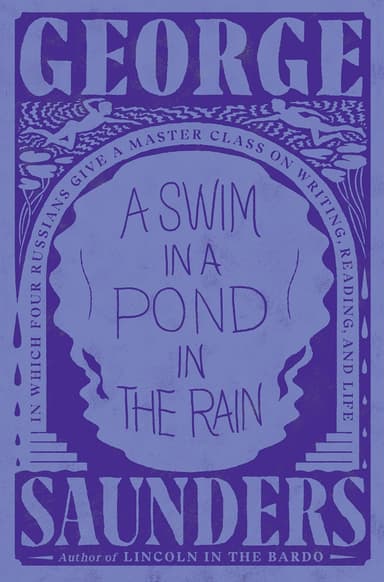
A Swim in a Pond in the Rain is essentially a writing course in book form. Saunders explores how great writing works, analysing seven classic short stories by Russian authors: Chekhov, Turgenev, Tolstoy, and Gogol. He explains how fiction connects writers and readers, and what makes a good story. I found the book fascinating, it solidified notions that I had about writing and how I was taught to write during my Masters and PhD, that good writing comes through constant sentence-by-sentence iteration and ruthless efficiency. What was completely new to me, however, is the art of writing fiction: escalating the story, creating causality and grasping the readers' imagination. A Swim in a Pond in the Rain is a book about the power of fiction and an excellent starting point for anyone looking to improve their writing, or just interested in what it takes to write good stories.
"These days, it’s easy to feel that we’ve fallen out of connection with one another and with the earth and with reason and with love. I mean: we have. But to read, to write, is to say that we still believe in, at least, the possibility of connection."
"This is a big moment for any artist (this moment of combined triumph and disappointment), when we have to decide whether to accept a work of art that we have to admit we weren’t in control of as we made it and of which we’re not entirely sure we approve. It is less, less than we wanted it to be, and yet it’s more, too—it’s small and a bit pathetic, judged against the work of the great masters, but there it is, all ours. What we have to do at that point, I think, is go over, sheepishly but boldly, and stand on our shit-hill, and hope it will grow."
"One feature of a beautifully ended story is that we can imagine the lives of the characters continuing on beyond it."
The Pragmatic Programmer: From Journeyman to Master (20th Anniversary Edition) - Andy Hunt and Dave Thomas
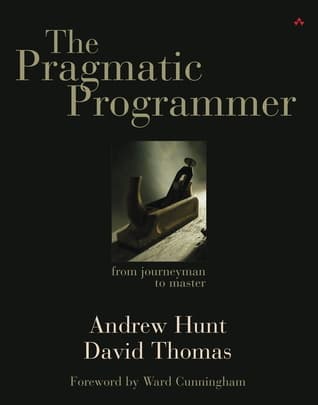
I first read The Pragmatic Programmer in 2015, as I was doing my Masters degree in Software Engineering and working part-time for the small software company where I had done my year-long industrial placement the year before. Reading it then, I remember it having a big impact on my day-to-day work, despite my limited professional experience and the book being outdated (it was originally published in 1999). This year I read the 20th anniversary edition, and with several more years of software development experience, working on enterprise-level projects and building and leading software teams, it has made a huge difference to my programming approach and my day-to-day work.
The book illustrates best practices and major pitfalls in software development, covering software rot, duplicating knowledge, bullet-proofing, testing, capturing requirements, harnessing automation and building effective teams. It gives lessons that could apply to any industry and even touches on philosophy. It is an exceptional book and a must-read for anyone working in the software industry.
"The greatest of all weaknesses is the fear of appearing weak."
"Don't be a slave to history. Don't let existing code dictate future code. All code can be replaced if it is no longer appropriate. Even within one program, don't let what you've already done constrain what you do next - be ready to refactor... This decision may impact the project schedule. The assumption is that the impact will be less than the cost of not making the change."
"You Can't Write Perfect Software. Did that hurt? It shouldn't. Accept it as an axiom of life. Embrace it. Celebrate it. Because perfect software doesn't exist. No one in the brief history of computing has ever written a piece of perfect software. It's unlikely that you'll be the first. And unless you accept this as a fact, you'll end up wasting time and energy chasing an impossible dream."
"An investment in knowledge always pays the best interest."
Any of these could easily have made it into the list:
- Outlive: The Science and Art of Longevity - Peter Attia
- Islands of Abandonment - Cal Flyn
- Discipline is Destiny: The Power of Self-Control - Ryan Holiday
- Algorithms to Live By: The Computer Science of Human Decisions - Brian Christian and Tom Griffiths
- The Immortal Life of Henrietta Lacks - Rebecca Skloot
Fiction
This year, a lot of my fiction reading has been taken up by Stephen King's Dark Tower Series and rereading Harry Potter (14 books and around 10,000 pages across both). The Dark Tower is a great read, but none of the books stood out to me as brilliant. And as much as I love Harry Potter, my third read-through in 4 years didn't hit quite the same as it has before. That being said, let's get into my fiction favourites...
Demon Copperhead - Barbara Kingsolver
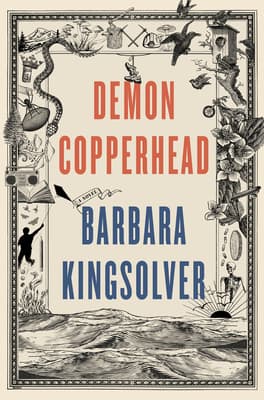
Demon Copperhead is a modern-day spin on Dickens' David Copperfield. Set in the Appalachia mountains, it tells a heartbreaking story of poverty, addiction and loss. Following the childhood and adolescence of the main character, it explores the historical exploitation and poverty of rural USA, the devastation of the Big Pharma-caused opioid epidemic, small town fame through high school football (Lydia and I have been watching Friday Night Lights, so this is a continuation of that theme) and foster-care in a privatised health system. The book is enthralling, devastating and profound.
"The landfill is where I figured out one of my main philosophies, that everybody alive is basically in the process of trading out their old stuff for different stuff, day in day out."
"Live long enough, and all things you ever loved can turn around to scorch you blind. The wonder is that you could start life with nothing, end with nothing, and lose so much in between."
"What the companies did, he told us, was put the shuthole on any choice other than going into the mines. Not just here, also in Buchanan, Tazewell, all of eastern Kentucky, these counties got bought up whole: land, hospitals, courthouses, schools, company owned. Nobody needed to get all that educated for being a miner, so they let the schools go to rot. And they made sure no mills or factories got in the door. Coal only. To this day, you have to cross a lot of ground to find other work. Not an accident, Mr. Armstrong said, and for once we believed him, because down in the dark mess of our little skull closets some puzzle pieces were clicking together and our world made some terrible kind of sense. The dads at home drinking beer in their underwear, the moms at the grocery with their SNAP coupons. The army recruiters in shiny gold buttons come to harvest their jackpot of hopeless futures. Goddamn."
The Border - Don Winslow
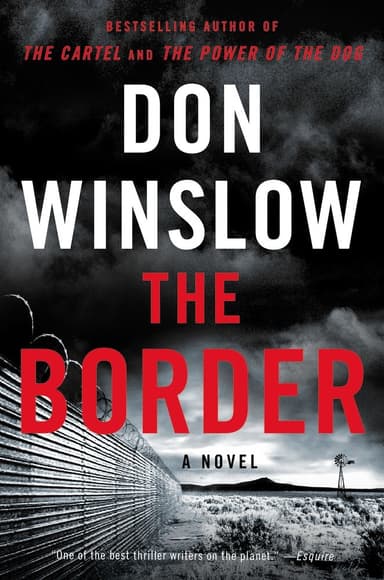
The Border is the final book in The Power of the Dog trilogy, which I've read all of this year. Think Narcos in book form: brutal violence, systemic corruption and brilliant characters in a narrative that tracks real events in the US 'war on drugs' from 1970 up to the present day. As with any book vs screen comparison, written text allows the story to be taken a lot deeper and gives a real perspective into the events it portrays and the lives of those impacted. The whole series is savage, raw and captivating, but The Border is my favourite of the three.
"A border is something that divides us but also unites us; there can be no real wall, just as there is no wall that divides the human soul between its best impulses and its worst."
"The ‘Mexican drug problem’ is not the Mexican drug problem. It is the American drug problem. We are the buyers, and without buyers, there can be no sellers."
Tomorrow, and Tomorrow, and Tomorrow - Garbrielle Zevin
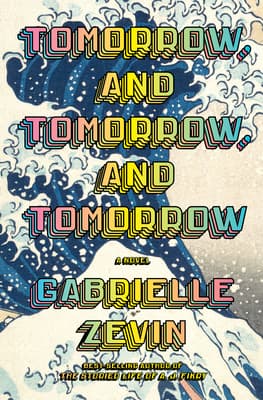
Tomorrow, and Tomorrow and Tomorrow is a love story as I've never read one before. Spanning 30 years, it follows two childhood friends, Sam Masur and Sadie Green, who rekindle their friendship to achieve fame and stardom by creating video games together whilst never quite revealing how they feel about each other. Zevin intertwines the philosophy and practicality of video game design (particularly the ability to try something over and over without consequences) into a tale of identity, disability and failure.
"What is a game?" Marx said. "It's tomorrow, and tomorrow, and tomorrow. It's the possibility of infinite rebirth, infinite redemption. The idea that if you keep playing, you could win. No loss is permanent, because nothing is permanent, ever."
"And what is love, in the end?" Alabaster said. "Except the irrational desire to put evolutionary competitiveness aside in order to ease someone else's journey through life?"
Remarkably Bright Creatures - Shelby Van Pelt
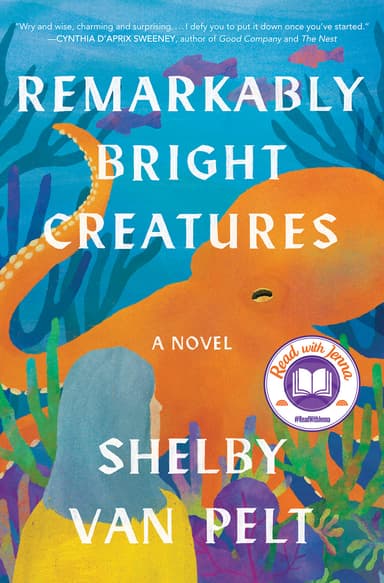
Remarkably Bright Creatures is a heartwarming and well-written story about a giant Pacific octopus confined to an aquarium in a small town in Washington state. Marcellus (the octopus) acts as a focal point for the book's other main characters: a lonely widow still dealing with the death of her 18-year-old son, and a lost 30-year-old figuring how what to do with his life. It's charming, wise, and surprising, and a great easy read.
"Humans. For the most part, you are dull and blundering. But occasionally, you can be remarkably bright creatures."
"Secrets are everywhere. Some humans are crammed full of them. How do they not explode? It seems to be a hallmark of the human species: abysmal communication skills."
Honourable mentions:
- The Dark Tower Series - Stephen King
- Harry Potter Series - J.K. Rowling
- The Giver of Stars - Jojo Moyes
- Homegoing - Yaa Gyasi
A Final Word
Thank you for reading. Please let me know if you read any of the books I've written about above, I'd love to hear what you thought of them. My goal for 2024 is still a book a week, so expect the next instalment in early 2025! I've also included some stats from my 8 years on Goodreads below.
Links to the previous yearly round-ups:
And the 500 book post.
Stats
Here are the stats from eight years on Goodreads:
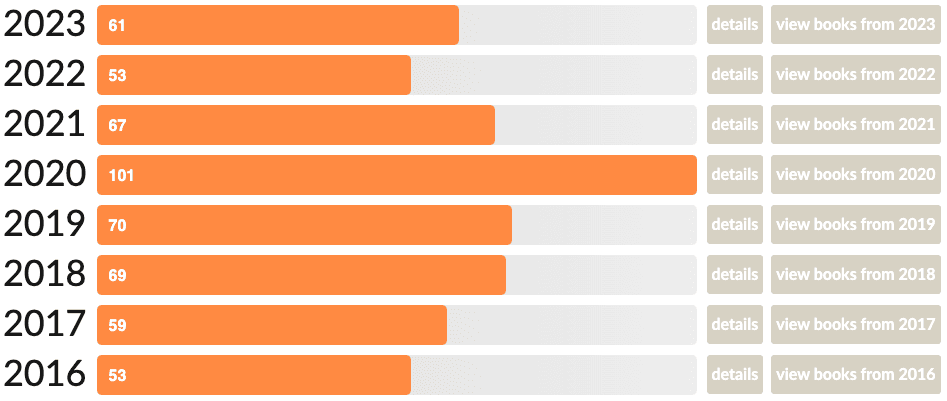
Book counts year-on-year
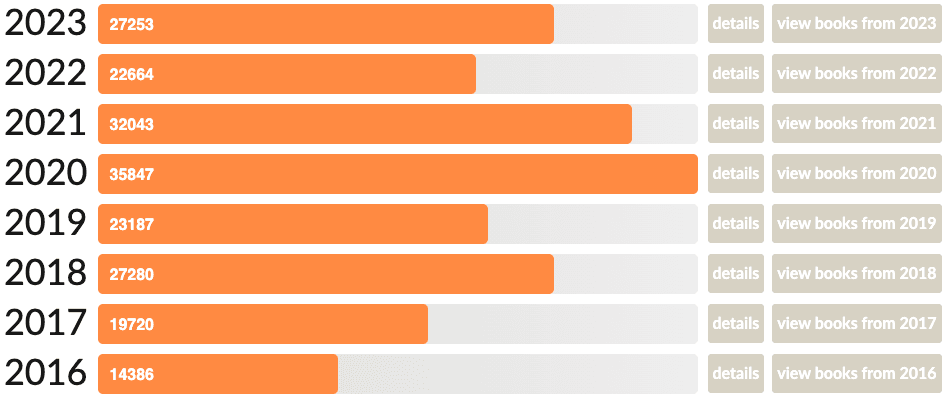
Page counts year-on-year
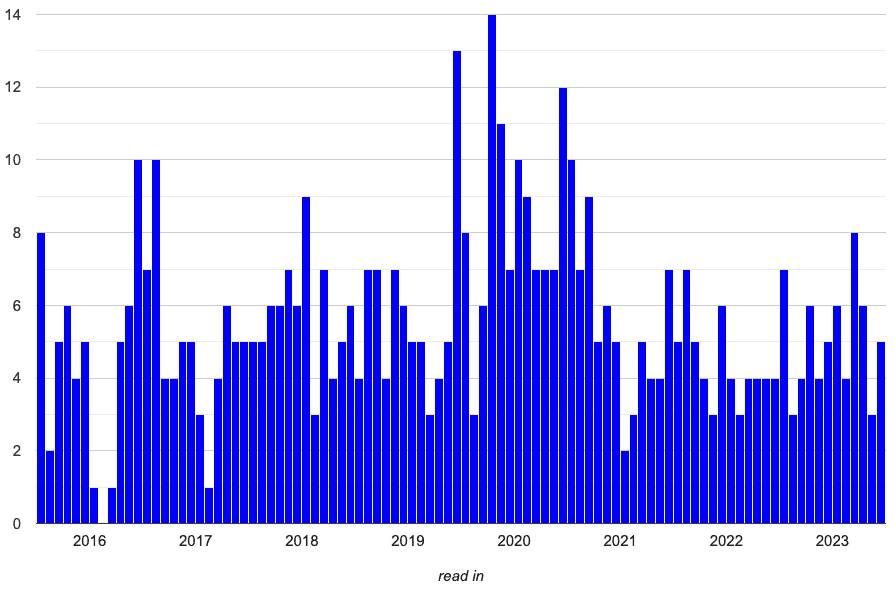
Book counts month-on-month
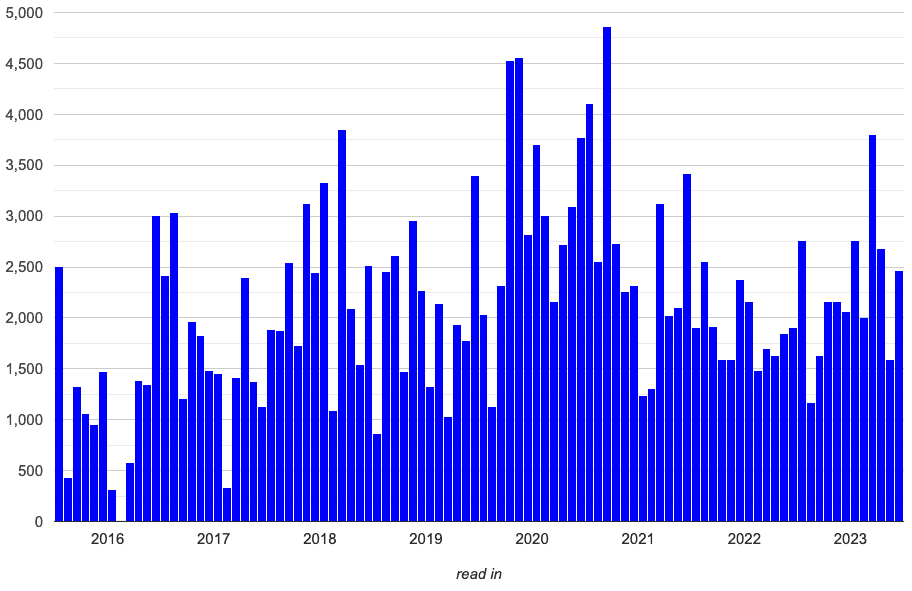
Page counts month-on-month